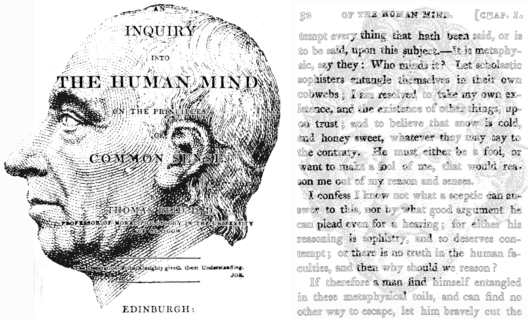Thomas Reid1710–1796
Reid was born in Strachan, in the north east of Scotland, and entered the ministry after studying at Marischal College, Aberdeen. In 1752 he became professor of philosophy at King's College, Aberdeen, and he was appointed successor to Adam Smith (1723-1790) as professor of moral philosophy at Glasgow University in 1764 - the same year that An Inquiry into the Human Mind, and on the Principles of Common Sense was published. He is represented twice: on the left in the title page of his Inquiry and on the right in text from the book in which he ridicules those philosophers who cast doubt on common sense. Reid reacted to Berkeley's idealism and Hume's scepticism by arguing that the evidence of external reality is provided by the common activities of the senses and is supported by common sense intuition. "Let scholastic sophisters entangle themselves in their own cobwebs; I am resolved to take my own existence, and the existence of other things, upon trust; and to believe that snow is cold, and honey sweet, whatever they may say to the contrary. He must either be a fool, or want to make a fool of me, that would reason me out of my reason and senses." Thus, Reid founded the Scottish common-sense school of philosophy, of which Stewart, Thomas Brown, and Hamilton were the principal protagonists. The school was opposed to associationism, particularly when it was couched in physiological language. Reid also proposed a faculty psychology; faculties were innate properties of the mind which exerted control over habits, or behaviour. His descriptive psychology could be studied by reflection on mental activity, by an analysis of the use of language, and by observations of behaviour. He provided a bridge between the extreme rationalists and empiricists. His belief in the power of reason was tempered by a desire to accumulate evidence empirically. He conducted experiments on space perception to show how people with squints gradually overcome double vision: "one who squints, and originally saw objects double by reason of that squint, may acquire such habits, that when he looks at an object with his best eye, he shall have no distinct vision with the other at all." This was supported by evidence from examinations of the visual acuity in each eye of twenty such individuals. He believed that the perception of objects was given directly by divine assistance but that sensation derives from physical objects themselves. Although they are described similarly in language, he considered that they were different - sensations referred to the immediate actions of the senses whereas perceptions are always associated with objects that continue to exist whether or not they are perceived. Perceptions could be innate or acquired. The separation of sensation from perception has remained with psychology to the present day.
